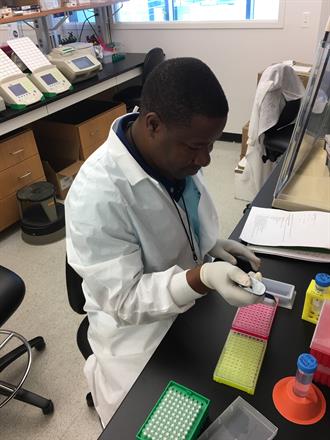A case study published in The New England Journal of Medicine titled “Emergence of Indigenous Artemisinin-Resistant Plasmodium Falciparum in Africa,” details an individual case of delayed clearance of malaria parasites (an early sign of drug resistance) after a patient was treated with an artemisinin-based combination therapy (ACT) – the most effective antimalarial medicines available today. The World Health Organization (WHO) recommends ACTs for the treatment of uncomplicated malaria caused by the Plasmodium falciparum parasite for the rapid and complete elimination of the parasite from the patient’s blood after completing a three-day course of treatment.
From its start, the U.S. President’s Malaria Initiative (PMI) has supported malaria-endemic countries to scale up the WHO recommendation that ACTs be used as first-line drugs for treatment of malaria due to P. falciparum infection.
If widespread drug resistance and ACT treatment failures were to emerge in Africa, this would pose a severe threat to malaria control and could potentially reverse many of the dramatic reductions in malaria morbidity and mortality achieved over the last decade.
While individual case reports of suspected resistance to ACTs require further investigation, these reports alone provide very limited information on the overall efficacy of antimalarial drugs. For example, the case described here details the delayed clearance of parasites in a single patient nearly four years ago. Without additional evidence, it is difficult to know whether the patient’s repeated exposure to antimalarials (including artesunate monotherapy) may have induced resistance in his infection, rather than the patient acquiring an already resistant falciparum strain that was circulating in the general population. Routine monitoring studies since that time have shown that ACTs continue to work well in Equatorial Guinea.
PMI has a decade-long history of supporting all aspects of a strategic effort to reduce the threat of emergence and spread of multidrug-resistant malaria, including:
- Monitoring the efficacy of first-line antimalarial treatments
- Strengthening measures to promote adherence to malaria treatment,
- Revising treatment policies when needed to provide the most effective drugs recommended by WHO
- Scaling up the use of diagnostic testing for malaria to reduce unnecessary drug use
- Providing only quality-assured malaria treatments to countries
- Conducting surveillance of the quality of antimalarial drugs and working with partner governments to remove substandard and falsified medicines from the market place.
Working closely with the WHO and other partners, PMI supports the monitoring of malaria treatment efficacy in all 19 focus countries in Africa and in the Greater Mekong sub-region (GMS). A therapeutic efficacy regional surveillance (TES) network of 46 sentinel sites in the GMS monitors first-line antimalarial drugs and potential alternatives.
In addition, the PMI-supported TES network throughout Africa is continuing to monitor ACT efficacy in more than 30 sites. With the recent identification of a genetic marker, called “K-13” for artemisinin resistance in Plasmodium falciparum, PMI is now supporting the testing of samples of patients from TES sites in Africa for presence of K-13 mutations as well as genetic markers for resistance to partner drugs. The results of this testing provide additional important information that when linked with the clinical outcomes from the TES patients will enable us to quickly identify the emergence of drug resistance, if and when it occurs. PMI’s support for TES and testing of genetic markers is already increasing knowledge and understanding on which markers are likely to be associated with antimalarial drug resistance. If resistance markers are identified in one or more of our TES sites in Africa, this testing network will enable us to monitor the geographic spread and intensification of resistance and to inform malaria treatment policies in countries and the global community.

